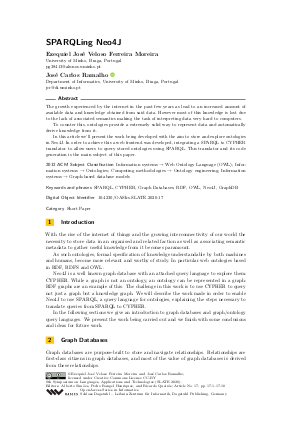SPARQLing Neo4J (Short Paper)
Authors
Ezequiel José Veloso Ferreira Moreira,
José Carlos Ramalho 
-
Part of:
Volume:
9th Symposium on Languages, Applications and Technologies (SLATE 2020)
Part of: Series: Open Access Series in Informatics (OASIcs)
Part of: Conference: Symposium on Languages, Applications and Technologies (SLATE) - License:
 Creative Commons Attribution 3.0 Unported license
Creative Commons Attribution 3.0 Unported license
- Publication Date: 2020-09-16
File

PDF
OASIcs.SLATE.2020.17.pdf
- Filesize: 348 kB
- 10 pages
Document Identifiers
Subject Classification
ACM Subject Classification
- Information systems → Web Ontology Language (OWL)
- Information systems → Ontologies
- Computing methodologies → Ontology engineering
- Information systems → Graph-based database models
Keywords
- SPARQL
- CYPHER
- Graph Databases
- RDF
- OWL
- Neo4J
- GraphDB
Metrics
- Access Statistics
-
Total Accesses (updated on a weekly basis)
0PDF Downloads0Metadata Views
Abstract
The growth experienced by the internet in the past few years as lead to an increased amount of available data and knowledge obtained from said data. However most of this knowledge is lost due to the lack of associated semantics making the task of interpreting data very hard to computers. To counter this, ontologies provide a extremely solid way to represent data and automatically derive knowledge from it. In this article we'll present the work being developed with the aim to store and explore ontologies in Neo4J. In order to achieve this a web frontend was developed, integrating a SPARQL to CYPHER translator to allow users to query stored ontologies using SPARQL. This translator and its code generation is the main subject of this paper.
Cite As Get BibTex
Ezequiel José Veloso Ferreira Moreira and José Carlos Ramalho. SPARQLing Neo4J (Short Paper). In 9th Symposium on Languages, Applications and Technologies (SLATE 2020). Open Access Series in Informatics (OASIcs), Volume 83, pp. 17:1-17:10, Schloss Dagstuhl – Leibniz-Zentrum für Informatik (2020)
https://doi.org/10.4230/OASIcs.SLATE.2020.17
BibTex
@InProceedings{moreira_et_al:OASIcs.SLATE.2020.17,
author = {Moreira, Ezequiel Jos\'{e} Veloso Ferreira and Ramalho, Jos\'{e} Carlos},
title = {{SPARQLing Neo4J}},
booktitle = {9th Symposium on Languages, Applications and Technologies (SLATE 2020)},
pages = {17:1--17:10},
series = {Open Access Series in Informatics (OASIcs)},
ISBN = {978-3-95977-165-8},
ISSN = {2190-6807},
year = {2020},
volume = {83},
editor = {Sim\~{o}es, Alberto and Henriques, Pedro Rangel and Queir\'{o}s, Ricardo},
publisher = {Schloss Dagstuhl -- Leibniz-Zentrum f{\"u}r Informatik},
address = {Dagstuhl, Germany},
URL = {https://drops.dagstuhl.de/entities/document/10.4230/OASIcs.SLATE.2020.17},
URN = {urn:nbn:de:0030-drops-130301},
doi = {10.4230/OASIcs.SLATE.2020.17},
annote = {Keywords: SPARQL, CYPHER, Graph Databases, RDF, OWL, Neo4J, GraphDB}
}
Author Details
References
- Cypher introduction. https://neo4j.com/docs/cypher-manual/current/introduction/. Accessed: 2020-04-30.
- Graphdb free. http://graphdb.ontotext.com/documentation/free/. Accessed: 2020-04-07.
- Neo4j: A reasonable rdf graph database & reasoning engine [community post]. https://neo4j.com/blog/neo4j-rdf-graph-database-reasoning-engine/. Accessed: 2020-04-07.
- Neo4j labs:incubating the next generation of graph developer tooling. https://neo4j.com/labs/. Accessed: 2020-04-30.
- Neoseantics create uniqueness constraint. https://neo4j.com/docs/labs/nsmntx/current/config/#create-resource-uniqueness-constraint. Accessed: 2020-06-30.
- Neo4j overview. https://neo4j.com/developer/graph-database/#neo4j-overview. Accessed: 2020-04-08.
- Nsmntx – neo4j rdf & semantics toolkit. https://neo4j.com/labs/nsmtx-rdf/. Accessed: 2020-04-30.
- Importing rdf data into neo4j. https://jbarrasa.com/2016/06/07/importing-rdf-data-into-neo4j/. Accessed: 2020-07-04.
- Peg.js website. https://pegjs.org/. Accessed: 2020-04-30.
- protégé:a free, open-source ontology editor and framework for building intelligent systems. https://protege.stanford.edu/. Accessed: 2020-06-30.
- Linear congruential generator. https://en.wikipedia.org/wiki/Linear_congruential_generator. Accessed: 2020-06-30.
- Definition of sparql. https://www.w3.org/TR/sparql11-query/#sparqlDefinition. Accessed: 2020-04-30.
- Sparql: Grammar. https://www.w3.org/TR/sparql11-query/#sparqlGrammar. Accessed: 2020-04-30.
- Sparql 1.1 query language. https://www.w3.org/TR/sparql11-query/. Accessed: 2020-04-30.
